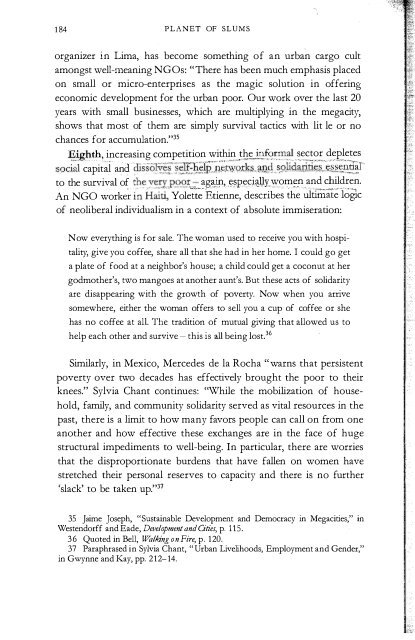Untitled - Rebel Studies Library
Untitled - Rebel Studies Library
Untitled - Rebel Studies Library
Create successful ePaper yourself
Turn your PDF publications into a flip-book with our unique Google optimized e-Paper software.
184<br />
PLANET OF SLUMS<br />
organizer In Lima, has become something of an urban cargo cult<br />
amongst well-meaning NGOs: "There has been much emphasis placed<br />
on small or micro-enterprises as the magic solution in offering<br />
economic development for the urban poor. Our work over the last 20<br />
years with small businesses, which are multiplying in the mega city,<br />
shows that most of them are simply survival tactics with little or no<br />
chances for accumulation."35<br />
Eighth, increasing competition within the j_ttfr!llal sector depletes<br />
soci;J capitl and Clisso1Yfssl£:liIp:n:t;x.jUHlc! · s9lidiItI: iiEr<br />
to the survival of the very,p(),9}: :::- agajn, (Cspecig!lywom? and children.<br />
An NGO worke in Hti, Yolctt'Etienne, describes the ltiffiat'l;;g1c<br />
of neoliberal individualism in a context of absolute immiseration:<br />
Now everything is for sale. The woman used to receive you with hospi<br />
tality, give you coffee, share all that she had in her home. I could go get<br />
a plate of food at a neighbor's house; a child could get a coconut at her<br />
godmother's, two mangoes at another aunt's. But these acts of solidarity<br />
are disappearing with the growth of poverty. Now when you arrive<br />
somewhere, either the woman offers to sell you a cup of coffee or she<br />
has no coffee at alL The tradition of mutual giving that allowed us to<br />
help each other and survive - this is all being lost.36<br />
Similarly, in Mexico, Mercedes de la Rocha "warns that persistent<br />
poverty over two decades has effectively brought the poor to their<br />
knees." Sylvia Chant continues: "While the mobilization of household,<br />
family, and community solidarity served as vital resources in the<br />
past, there is a limit to how many favors people can call on from one<br />
another and how effective these exchanges are in the face of huge<br />
structural impediments to well-being. In particular, there are worries<br />
that the disproportionate burdens that have fallen on women have<br />
stretched their personal reserves to capacity and there is no further<br />
'slack' to be taken Up."37<br />
35 Jaime Joseph, "Sustainable Development and Democracy in Megacities," in<br />
Westendorff and Eade, Development and Cities, p. 115.<br />
36 Quoted in Bell, Walking on Fire, p. 120.<br />
37 Paraphrased in Sylvia Chant, "Urban Livelihoods, Employment and Gender,"<br />
in Gwynne and Kay, pp. 212-14.<br />
A SURPLUS HUMANITY? 185<br />
Ninth, and ftnally, under such extreme conditions of competition,<br />
the neoliberal prescription (as set out in the World Bank's 1995 World<br />
Development Reporf) of making labor even more flexible is simply catastrophic.38<br />
De Sotan slogans simply grease the skids to a Hobbesian<br />
hell. Those engaged in informal-sector competition under conditions<br />
of inftnite labor supply usually stop short of a total war of all against<br />
all; conflict, instead, is usually transmuted into ethnoreligious or racial<br />
violence. The godfathers and landlords of the informal sector (invisible<br />
in most of the literature) intelligently use coercion, even chronic<br />
violence to regulate competition and protect their investments. As<br />
'hilip Amis emphasizes: "There are barriers to entry in terms of<br />
capital, and often political terms, wEjch create __.!endency towards<br />
monopoly in the successful areas of the informal sector; these are difftcult<br />
to get into."39<br />
Politically, the informal sector, in the absence of enforced labor ')<br />
rights, is a semifeudal realm of kickbacks, bribes, tribal loyalties, and<br />
ethnic exclusion. Urban space is never free. A place on the pavement,<br />
the rental of a rickshaw, a day's labor on a construction site, or a<br />
domestic's reference to a new employer: all of these require patronage<br />
or membership in some closed network, often an ethnic militia or street<br />
gang. Whereas traditional formal industries such as textiles in India or<br />
oil in the Middle East tended to foster interethnic solidarity through<br />
unions and radical political parties, the rise of the unprotected informal<br />
sector has too frequently gone hand in hand with exacerbated ethnoregious<br />
differentiation and sectarian violence.4o<br />
38 Breman, The Labouring Poor, pp. 5, 201.<br />
39 Philip Amis, "Making Sense of Urban Poverty," Environment and Urbanization<br />
7:1 (April 1995), p. 151.<br />
40 I think Manuel Castells and Alejandro Portes, however, went too far in a 1989<br />
essay that suggests that the proletariat is "fading away" in the face of the "increasing<br />
heterogeneity of work situations and, thus, of social conditions." (Castells and Portes,<br />
"World Underneath: The Origins, Dynamics and Effects of the Informal Economy,"<br />
in Portes, Castells, and Lauren Benton (eds), The Informal Economy: <strong>Studies</strong> in Advanced<br />
ad Less Developed Counl1ies, Baltimore 1989, p. 31.) Informal workers, in fact, tend to be<br />
massively crowded into a few major niches where effective organization and "class consciousness"<br />
might become possible if authentic labor rights and regulations existed. It<br />
is the lack of economic citizenship, rather than livelihood heterogeneity per se, that<br />
makes informal labor so prone to clientalist subordination and ethnic fragmentation.<br />
I thus echo Jan Breman when he says that main issue in the informal sector is the<br />
lrmalization of the rights and protections of labor, not property (p. 201).<br />
(


